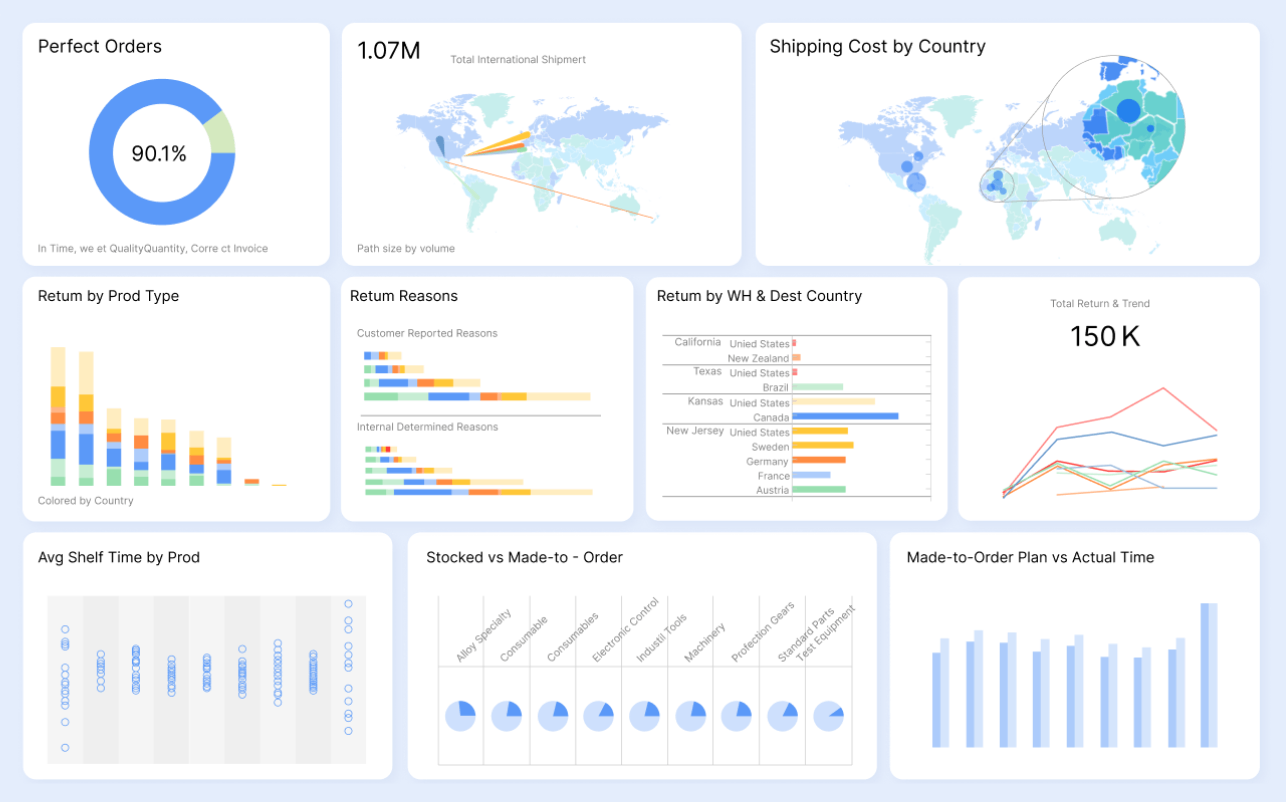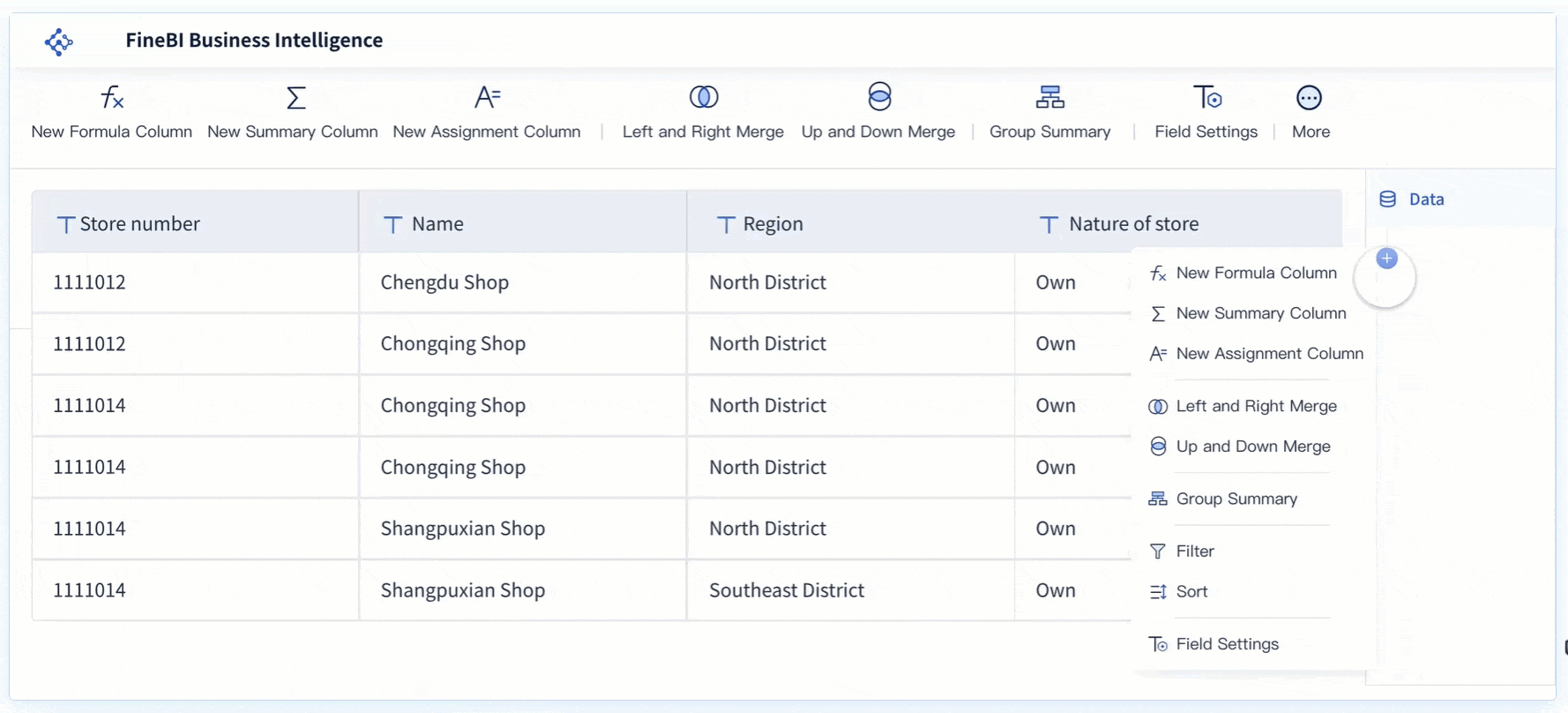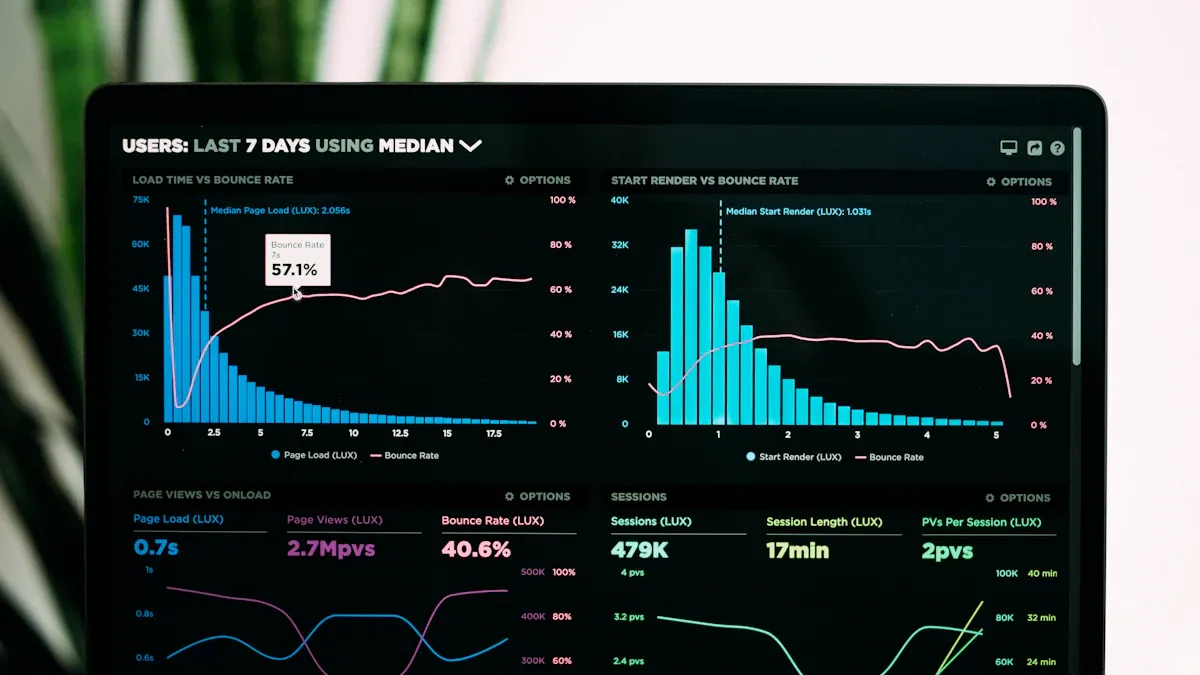A business intelligence engineer amazon works to turn raw data into actionable insights that support amazon business intelligence. This role focuses on collecting, analyzing, and visualizing information to help teams make better decisions. Every business intelligence engineer plays a key part in shaping amazon business intelligence by building reports, dashboards, and automation processes. These professionals use business intelligence tools to connect different data sources and create clear visualizations. As a result, amazon business intelligence teams can respond quickly to trends and improve their strategies.
Every demo in this article was designed using FineBI. Ready to unlock smarter insights? Click below to start your free FineBI trial and see what’s possible!

A business intelligence engineer at Amazon transforms data into valuable insights that drive business decisions. This role combines technical expertise with analytical thinking. The engineer develops and implements advanced statistical models and tools. They perform statistical analysis and evaluate large datasets. The engineer designs scalable infrastructure for reporting and analytics. They structure complex problems and create cross-disciplinary analytics solutions. The engineer provides actionable recommendations for strategic planning, product strategy, marketing, and customer service. They extract, transform, and clean large multi-terabyte datasets using SQL and programming. The engineer applies data science, machine learning, and data mining techniques. They manage a BI team and set priorities. The engineer partners with stakeholders to deliver BI solutions for complex problems. They ensure engineering and operational excellence in BI processes. The engineer defines metrics to measure team progress, data quality, and operational excellence. They make strategic decisions that impact BI infrastructure, resources, and costs. The engineer communicates effectively with diverse audiences and contributes to strategic documents.

Business intelligence engineers at Amazon perform a hybrid role. They combine analytics and engineering skills. They work on data modeling, warehousing, and building ETL pipelines. The engineer uses data visualization tools such as Tableau and FineBI. They apply statistical analysis software like R, SAS, and Matlab. Python scripting helps with data processing and modeling. Unlike data analysts or data engineers, the business intelligence engineer provides both analytical insight and technical engineering.
Business intelligence engineers at Amazon follow a structured routine. Their daily tasks include:
The role is cross-functional. The engineer collaborates with business leaders, product managers, data engineers, and data scientists. They prioritize impactful projects and programs to drive business forward. The engineer identifies complex business problems and implements solutions to improve operational and financial systems. They provide technical expertise in data extraction, integration, and analysis. The engineer automates processes through development of tools and dashboards. Collaboration with executives and business units helps them understand needs and deliver optimal BI solutions. The engineer maintains a strong bias for action and adapts to a rapidly evolving environment. Balancing technical skills with business acumen and people skills is critical for stakeholder engagement.
A business intelligence engineer at Amazon plays a central role in transforming raw data into meaningful insights. They use a variety of reporting tools and methodologies to support amazon business intelligence. Common tools include Amazon QuickSight, Tableau, Looker, and Microsoft Power BI. These platforms help engineers visualize operational data and consolidate information from different sources.
Business intelligence engineers design and build dashboards that track key metrics. They generate reports, conduct queries, and interpret data for decision-makers. Their work supports strategic planning and ensures that teams have access to accurate, up-to-date information. By applying both quantitative and qualitative data analysis, they help amazon business intelligence teams identify trends and make informed choices.
Tip: Data visualization is essential for communicating complex findings. Engineers create clear charts and graphs to highlight performance and support business goals.
Business intelligence engineers construct robust data pipelines to support amazon business intelligence operations. These pipelines move data from various sources, process it, and store it for analysis. The process involves several key steps:
| Step | Description | AWS Services Used |
|---|---|---|
| Data Ingestion | Collect raw data from various sources | Amazon Kinesis, AWS Data Pipeline |
| Data Storage | Store data securely and scalably | Amazon S3, Amazon Redshift |
| Data Processing | Transform raw data into usable formats | AWS Glue, Amazon EMR, AWS Lambda |
| Data Analysis | Extract insights and visualize data | Amazon Athena, Amazon Redshift, QuickSight |
Engineers plan and design these pipelines to ensure scalability, security, and cost efficiency. They select the right orchestration tools and structure workflows into extraction, transformation, and loading stages. Automation plays a vital role in this process. By automating data ingestion, report downloads, and processing, engineers reduce manual labor and minimize errors. Automation also enables amazon business intelligence teams to handle more data and scale operations without increasing workload.
Performance improves as automation reduces errors and increases speed. This efficiency supports amazon business intelligence by delivering timely insights and supporting business growth.
Business intelligence engineers work closely with many departments at Amazon. They collaborate with data scientists, software engineers, and architects to solve complex business problems. These partnerships are essential for developing solutions that improve performance and customer experience.
| Amazon Department | Collaborating Teams | Nature of Collaboration |
|---|---|---|
| Amazon Shipping | Business Intelligence Engineers, Applied Scientists, Software Development Engineers | Improve package movement predictions, cost auditing, and logistics through machine learning and data science. |
| AWS Industries | Business Intelligence Engineers, Data Scientists, Engineers, Architects | Implement generative AI solutions, build AI applications, and deploy models for customers. |
| Sponsored Products Ads | Business Intelligence Engineers, Applied Scientists, Software Development Engineers | Teamwork on machine learning, AI research, and model development focused on business problems. |
These collaborations help define and align on clear, measurable key metrics that reflect customer value and business impact. Business intelligence engineers analyze A/B tests, segment data, and recommend next steps based on statistical significance. They design dashboards and metrics that track operational performance, delivery accuracy, and user engagement. Their work ensures data integrity and supports data-driven decision-making.
Note: Cross-team collaboration leads to improved operational efficiency, profitability growth, and enhanced customer experience. Business intelligence engineers play a key role in translating complex data into strategic insights that drive amazon business intelligence forward.
Business intelligence engineers play a vital role in amazon business intelligence by enabling teams to make informed choices. They own end-to-end analytics projects, from building dashboards to maintaining reports and planning models. These engineers collaborate with business units such as demand planning, finance, and networking. Their work ensures that every department benefits from accurate data and clear visualizations.
Business intelligence engineers also act as subject matter experts for BI tools. They train others and promote best practices in reporting and analysis. By performing system audits, they maintain complete and accurate data reporting. Their efforts help invent new ways to measure program effectiveness and organizational productivity. The Intel & Reporting team uses these insights to drive operational and financial efficiencies across AWS infrastructure services.
Business intelligence engineers define and track KPIs, automate data pipelines, and develop dashboards that provide actionable, data-driven insights. Their work ensures that amazon business intelligence decisions are always backed by data, leading to continuous performance evaluation and alignment with business objectives.
Amazon business intelligence engineers directly impact customer experience through their work. They support high-impact decisions, such as the development of Amazon's AI-driven personalized recommendation engine. This system uses machine learning and data analysis to suggest products, making shopping faster and more relevant for customers.
Some key improvements include:
Amazon business intelligence teams also use predictive analytics to anticipate customer needs and suggest complementary products. They collect feedback through surveys and reviews, using this data to improve services. Business intelligence engineers help optimize delivery logistics, ensuring packages arrive quickly and safely. Their work supports features like real-time updates and accurate delivery mapping.
A table below summarizes the impact areas:
| Impact Area | Example Contribution |
|---|---|
| Personalized Shopping | Product suggestions, review highlights |
| Seamless Experience | Omnichannel integration, voice shopping |
| Operational Performance | Optimized delivery, predictive analytics, fast shipping |
Amazon business intelligence engineers help maintain high customer satisfaction scores and user engagement. Their focus on meaningful insights and continuous improvement supports Amazon’s business intelligence strategy and drives better performance across the company.

A business intelligence engineer at Amazon needs a strong foundation in both technology and analytics. They must understand how to work with large datasets and use business intelligence tools to extract insights. Key qualifications include:
These skills help the business intelligence engineer analyze data, build dashboards, and support decision-making across Amazon.
Business intelligence engineers rely on a range of business intelligence tools and data analytics tools to manage and analyze information. FineBI by FanRuan stands out as a powerful solution for Amazon’s data-driven environment. FineBI integrates with major cloud platforms, including amazon web services and Amazon FinSpace, making it easy for engineers to connect to multiple data sources. Its self-service analytics platform allows users to build interactive dashboards with a simple drag-and-drop interface. FineBI also supports real-time data analysis and offers a wide variety of visualization options. When paired with FineDataLink, FineBI enables seamless data integration, automated synchronization, and agile analytics. This combination helps business intelligence engineers deliver actionable insights and maintain high data quality.

A business intelligence engineer must communicate findings clearly and solve problems quickly. They often face challenges such as integrating data from diverse sources, managing data quality, and breaking down data silos. The table below shows common challenges and how engineers resolve them:
| Common BI Challenges | Description | Resolution Approaches |
|---|---|---|
| Integrating data from diverse sources | Combining data from many systems is complex | Use data warehouses, custom ETL, and data integration tools |
| Data quality issues | Poor data quality affects accuracy | Apply data management strategies and track data lifecycle |
| Data silos | Isolated data causes confusion | Harmonize definitions and establish clear KPIs |
| Poor dashboard design | Unclear dashboards reduce effectiveness | Involve UX designers and use good visualization practices |
Strong communication and problem-solving skills help the business intelligence engineer turn complex data into clear, actionable insights for Amazon’s teams.
A business intelligence engineer at Amazon usually starts with a strong educational background. Most candidates earn a bachelor’s degree in engineering, computer science, or a related field. Many senior professionals hold a master’s degree and industry certifications. Building technical skills in database management and business knowledge is important for career growth.

Successful candidates also show a strong foundation in data analysis and interpretation. They become proficient in SQL and learn programming languages like Python or R. Experience with data visualization tools, such as Tableau or Power BI, is valuable. Understanding cloud technologies, especially AWS, helps candidates stand out.
The application process for a business intelligence engineer at Amazon is competitive. Candidates should prepare for several interview rounds, including technical and behavioral assessments. The technical interview often focuses on SQL, data modeling, and statistics. Candidates should master SQL topics such as joins, window functions, and query optimization. Practicing Amazon-specific SQL questions on platforms like LeetCode can help.
Tip: Use the STAR method (Situation, Task, Action, Result) to structure answers for behavioral questions. Prepare stories that show leadership, problem-solving, and customer focus.
The interview also tests knowledge of Amazon’s Leadership Principles. Candidates should prepare 15-20 scenarios that demonstrate these principles. The Bar Raiser round evaluates cultural fit and leadership skills. Interviewers may ask about calculating user subscription percentages, handling salary gaps, or optimizing queries. Candidates should explain their thought process clearly and quantify their impact when possible.
A recruiter can provide insights about the interview process and expectations. Asking thoughtful questions during the interview shows genuine interest in the business intelligence team.
Business intelligence engineers at Amazon drive data-driven decisions, build robust analytics solutions, and collaborate across teams. They use advanced tools like FineBI by FanRuan to integrate data and create actionable insights.
Aspiring candidates should practice data analysis, learn modern BI tools, and gain experience with large datasets to excel in this dynamic field.
What Does a Business Intelligence Developer Do in 2025
What Does a Business Intelligence Engineer Do in 2025
Top Business Intelligence Tools to Explore in 2025
What is Retail Industry Data Analysis and Why It Matters
Top Tools for Retail Data Analysis in 2025
A Business Intelligence Engineer at Amazon turns raw data into insights. They build dashboards, automate reports, and help teams make better decisions using data.
Amazon engineers use tools like Amazon QuickSight, Tableau, and FineBI by FanRuan. These platforms help them connect to data sources, create dashboards, and analyze information quickly.
FineBI provides self-service analytics, real-time dashboards, and seamless data integration. Engineers use FineBI to connect multiple data sources, automate reporting, and deliver actionable insights for Amazon’s teams.
Key skills include SQL, Python, data modeling, and experience with BI tools. Strong communication and problem-solving abilities also help engineers explain findings and solve business challenges.
Candidates should practice SQL, review data modeling concepts, and study Amazon’s Leadership Principles. Mock interviews and hands-on projects with BI tools like FineBI can boost confidence and readiness.

The Author
Lewis
Senior Data Analyst at FanRuan
Related Articles

What is a Business Intelligence System and How Does It Work
A business intelligence system collects, analyzes, and visualizes data, turning raw information into actionable insights for smarter business decisions.
Lewis
Jan 04, 2026

Top 3 Retail Management Software Picks
Compare the top 3 retail management software. See features, pricing, and which solution fits your business needs for inventory and sales.
Lewis
Dec 30, 2025

What Are Enterprise BI Solutions and How Do They Work
Enterprise BI solutions unify business data, enabling real-time analytics, secure collaboration, and smarter decision-making across your organization.
Lewis
Dec 22, 2025